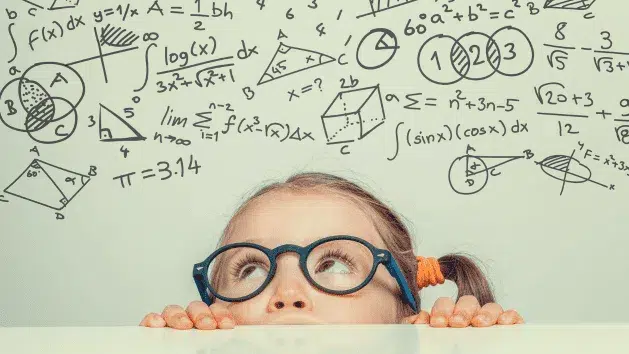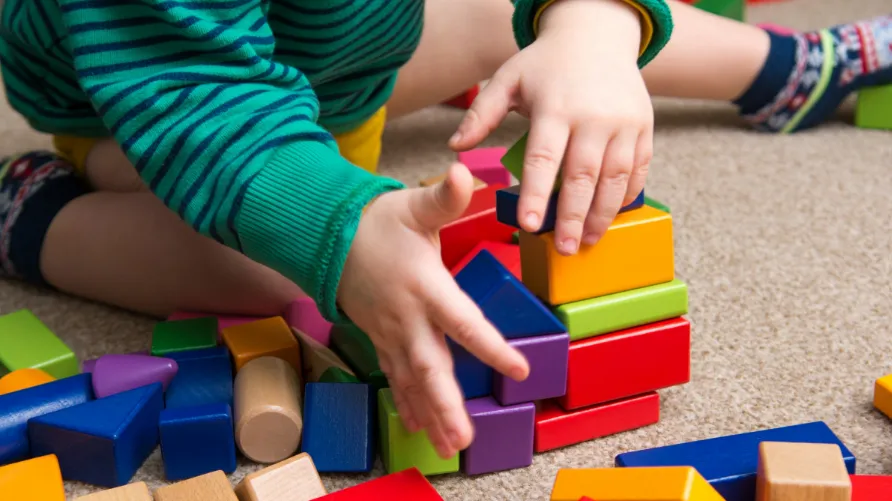
Dyscalculia in children

How does dyscalculia manifest itself in children?
For children with dyscalculia, a number is not just a character printed on paper or displayed on a screen. It’s a real puzzle! 😵💫 A symbol full of mystery and complexity… They may not only have difficulty recognizing and writing them, but also in understanding what they represent. For example, the number “5” is not intuitively associated with a collection of five objects.
✏ Note: Dyscalculia is not linked to the child’s intelligence, but to a specific difficulty in mathematics. For him, it’s a bit like a foreign language that’s hard to understand.
Difficulties with arithmetic
Dyscalculic children have difficulty performing basic operations such as addition and subtraction, or understanding the concepts of “greater than” and “less than”. Multiplication tables, fractions and percentages seem insurmountable.
In a standard classroom, these children may feel lost, frustrated or lose confidence when they can’t keep up with their peers.
Don’t confuse dyscalculia with learning delays
A delay or “problem with maths” does not necessarily mean the presence of a dyscalculic disorder. Not being good at mental arithmetic or never remembering the result of 8×7, even in adulthood (personal experience of the author), does not prevent success at school.
This type of occasional difficulty should not be confused with dyscalculia, which is a specific learning disorder of neurobiological origin that persists over time and requires specific support.
What causes dyscalculia?
Dyscalculia is a complex puzzle, with no single cause, but rather a combination of neurobiological, genetic and environmental factors.
A neurobiological origin
Neuroscience research suggests that dyscalculia is associated with dysfunction in certain areas of the brain, notably those associated with numerical and spatial processing. Alterations in the functioning of these areas (mainly in the parietal cortex) affect the way children perceive and interact with numbers, spaces and quantities.
Is dyscalculia hereditary?
Although no systematic link has been established, some studies indicate that dyscalculia may have a hereditary component. If other family members have experienced marked difficulties in mathematics, there is a greater likelihood that the child will too. This does not mean, however, that if you are dyscalculic, your child will necessarily be dyscalculic: we’re talking about probability here 😉
Weak cognitive processes
In some cases, weaknesses in cognitive processes can explain learning difficulties such as dyscalculia. Examples include difficulties with working memory or inhibition.
It is possible that these different factors interact with each other in a way that aggravates the symptoms. For example, a genetic predisposition could be exacerbated by an inhibition deficit or a learning disability (ADHD or dyslexia, for example).
How can I tell if my child is dyscalculic?
Warning signs
Every child is unique and progresses at his or her own pace. But sometimes there are certain signs that can give us cause for concern. If your little one seems at a loss when it comes to numbers, or categorically refuses any activity involving numbers… it may be time to ask a few questions.
Difficulty counting on his fingers, confusions such as mixing up 26 and 62, or not knowing which of the two numbers 888 and 8 is the bigger, could potentially be signs of dyscalculia.
Ask your teacher’s opinion
But before you jump to conclusions and let your worries get the better of you, a chat with your teacher might enlighten you. After all, who better to observe and understand your child’s challenges in the classroom? Remember, each child develops his or her skills at his or her own pace.
Have dyscalculia diagnosed by a professional
If your doubts are confirmed or persist, it’s time to consult a remedial professional, such as a speech therapist or neuropsychologist, who can make a diagnosis.
How to support a child with dyscalculia?
Professionals who can help: speech therapists and occupational therapists
Once a diagnosis has been made by a professional, sessions with a speech therapist may be recommended. He or she will help your child develop ways of compensating for the symptoms of his or her disorder.
Consulting an occupational therapist can also be useful in finding solutions for adapting your child’s environment, both at school and at home, and proposing appropriate activities to help your child become more independent.
Support starts with kindness
Children with dyscalculia need to be aware of their disorder. Support from parents and teachers is necessary to help them understand that they are not “bad”, but that their brain works differently.
As always with neurodevelopmental or learning disorders, listening, empathy and benevolence are essential. So, we avoid putting pressure on the child and encourage him by highlighting his efforts and successes. 🥰
What games can help develop children’s mathematical skills?
Games are excellent allies: they help children become familiar with numbers in a playful context.
- Board games with numbers: Uno and dominoes are fun solutions for getting to grips with the basics of mathematics from an early age. A simple card game can be used from the age of 5 or 6 to understand the concepts of “greater than” and “less than”, by playing battle, for example. As they get older, children will manipulate larger numbers and add up (almost) without realizing it, by playing Bonne Paye or Monopoly. 🎩
- Cooking: measuring ingredients for a recipe helps them understand units of measurement and proportions. Whether using a measuring cup, a scale or counting the number of spoons or pots of yoghurt, leave the heavy responsibility of measuring out each component to your little clerk. 🧑🍳
- Interactive games: an educational video game like Babaoo, which helps develop executive skills such as attention and inhibition, necessary for the development of mathematical skills, or applications specifically designed for dyscalculia can be useful to encourage your little one to practice independently.
- Treasure hunts: in need of inspiration? Organize a treasure hunt where the clues are little math problems to solve.
✏ Note: Dyscalculia can’t be prevented, but introducing toddlers to numbers, through educational games for example, helps them become familiar with mathematical concepts.
Patience and understanding
As is often the case, kindness, listening and empathy are the key words. Encouragement and praise are preferred, and time is taken to understand and explain the reasons for the error.
💡 Babaoo’Tips :
- To help your child visualize mathematical concepts, use everyday objects and concrete problems. This makes learning less intimidating and the concepts less abstract.
- Take advantage of every opportunity to highlight a mathematical concept or get your child to perform an operation: counting the number of guests to set the table, making change, or counting the number of cuddly toys waiting for him on his bed! 🧸
✏ Note: Nor should your child’s dyscalculia become an omnipresent cause for concern. Stimulate him on a daily basis: yes. But be careful not to overdo it. You also need to give your child time to breathe and enjoy activities he or she enjoys, without trying to get him or her to do math at all costs…
Dyscalculia in adolescence and adulthood
It’s a myth that neurodevelopmental disorders disappear with age: dyscalculia persists over time. Fortunately, family support and appropriate assistance from an early age will help the child develop coping strategies. Even if he’s unlikely to become an accountant (although…), your child will gradually learn to manage his disorder and live well with it. 😊
The Babaoo recap!
- Dyscalculia is a neurodevelopmental disorder specific to mathematics that affects children in a variety of ways.
- Its causes are multifactorial, and dyscalculia can coexist with other neurodevelopmental disorders such as dyslexia, dyspraxia or attention deficit disorder with or without hyperactivity..
- Professional support, kindness, playful methods and good communication with teachers are essential to help the child find coping strategies.
- Every dyscalculic child is unique and deserves tailored support to understand their disorder and learn to live well with it. 🌸
You may also be interested in these articles



